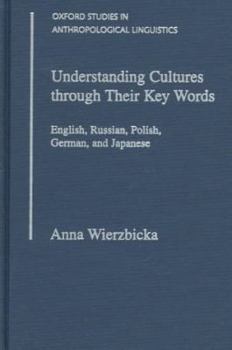Understanding Cultures Through Their Key Words: English, Russian, Polish, German, and Japanese
Select Format
Select Condition 
Book Overview
This book develops the dual themes that languages can differ widely in their vocabularies, and are also sensitive indices to the cultures to which they belong. Wierzbicka seeks to demonstrate that every language has "key concepts," expressed in "key words," which reflect the core values of agiven culture. She shows that cultures can be revealingly studied, compared, and explained to outsiders through their key concepts, and that the analytical framework necessary for this purpose is provided by the "natural semantic metalanguage," based on lexical universals, that the author andcolleagues have developed on the basis of wide-ranging cross-linguistic investigations. Appealing to anthropologists, psychologists, and philosophers as well as linguists, this book demonstrates that cultural patterns can be studied in a verifiable, rigorous, and non-speculative way, on the basis ofempirical evidence and in a coherent theoretical framework.
Format:Hardcover
Language:English
ISBN:0195088352
ISBN13:9780195088359
Release Date:August 1997
Publisher:Oxford University Press, USA
Length:328 Pages
Weight:1.15 lbs.
Dimensions:0.9" x 6.1" x 9.3"
Customer Reviews
1 rating
Fascinating stuff.
Published by Thriftbooks.com User , 25 years ago
Contrary to the previous reviewer's opinion, I found this book fascinating. I don't have a Ph.D. in linguistics either.Her claim is *not* that one cannot understand the key words of a culture without being immersed in the culture, only that one cannot understnad the key words of a culture by means of simplistic translations or definitions. She attempts to provide careful and precise definitions, given in what she calls the "Natural Semantic Metalanguage" -- an extremely restricted vocabulary consisting of words that, as far as she has been able to tell via research, have equivalents in every natural language.I don't buy all of her "Natural Semantic Metalanguage" theories (for which see her other book _Semantics: Primes and Universals_) but it sure is a useful tool for the job she's doing here.





